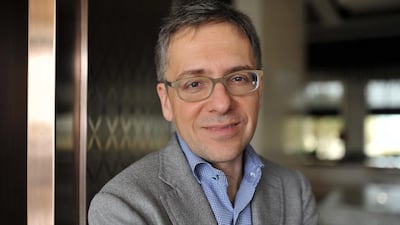Saudi Arabia’s National Transformation Programme is a well thought-out piece of strategy, but the kingdom may struggle to implement the reforms required to deliver it, according to a leading expert on global political risk.
Ian Bremmer, the founder of New York-based consultancy Eurasia Group, described the National Transformation Programme developed last year as “absolutely right” in terms of its concept and something that he believes is essential for the kingdom to implement.
“The Saudis are vastly overexposed to their petroleum complex and the goods around that. That is a bad place to be for the long term,” said Mr Bremmer.
“They are underinvested in education [and] they face a conservative, religious environment that’s made it very difficult to unlock the natural capabilities of half of their population.”
Mr Bremmer said that the plan, which was unveiled by Saudi Deputy Crown Prince Mohammed Bin Salman in June last year, has set the right targets in attempting economic diversification, social reforms and improvements in education.
“If you’d have asked me to write a plan with Eurasia Group I would have been hard-pressed to come up with something more comprehensive or better. But I fear it’s too late.”
He said that the proposed reforms are likely to face “a lot of institutional pushback” – especially unpopular measures such as subsidy cuts.
“We’re already seeing that. It’s not clear that Mohammed Bin Salman has enough power himself at this point to make it happen. And also, they should have started this 20 years ago.
“I obviously want them to succeed. It’s very important for them to succeed — for the region and ultimately globally – but it’s a risky bet.”
Speaking during an exclusive interview in Abu Dhabi, Mr Bremmer said that “every time I go to the Emirates, it changes dramatically”.
“If you want to be a small country that’s open and globalised, the Middle East is a hard place to do it. If you look at Switzerland, that’s a very easy place to be open and globalised because you’re surrounded by a bunch of stable places. If you’re Singapore, it’s not as easy as Switzerland, but it’s still pretty easy.
“If you’re trying to be Singapore or Switzerland, but you’re in the Middle East … you are exposed to enormous amounts of instability.”
He said that there is “a lot of downside risk” with both the UAE’s location and its environment, but added that “the people and the government, both in Abu Dhabi and Dubai, have done a lot of thinking big”.
“If you think about the taxi pod that you guys are planning to launch in the next few months, we should have that in the US and we’re not doing it. Think about the Hyperloop that should be done in the US but it’s being done here. I think about the experiments being done with Cleveland Clinic and with NYU – the Rhodes scholars that you have coming out of the NYU now in the Emirates is extraordinary.”
He said, however, there is still work to be done in the area of migrant labour.
“But overall I would say that this is a country that if you just look at the governance, the transparency, the willingness to live by metrics, the strategic planning … it’s a country that’s actually on a good course.”
Jason Tuvey, a Middle East economist with London-based Capital Economics, said that Saudi Arabia’s government has made good progress to date on its National Transformation Programme – so much so that there is scope to ease off some of the austerity measures introduced.
“Over a longer horizon, though, we still have our doubts that the kingdom will be able to reduce its dependence on oil,” said Mr Tuvey. He said incentive structures in the economy remain skewed towards well-paid government jobs and that productivity within the non-oil private sector remains low.
He also said that the business environment in the kingdom “is among the worst in the Gulf”.
“The government has outlined plans to make it easier for firms to acquire licences and permits. But there needs to be a streamlining of bureaucracy and a radical shift in the conduct of business in the kingdom in order to spur much-needed private investment.”
mfahy@thenational.ae
Follow The National's Business section on Twitter


